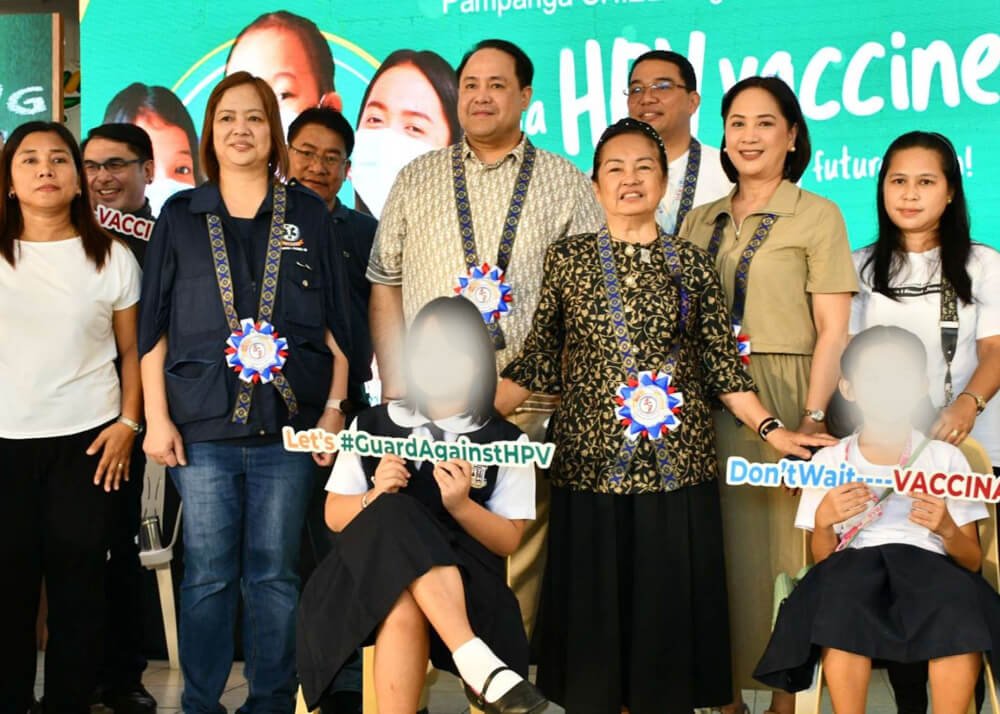Up to 17,000 female school-aged children in Pampanga will receive much-needed protection against cervical cancer since Pampanga LGU’s large-scale, school-based HPV vaccination drive in the province has started.
Aptly themed “Sa Aking Paglaki, Walang HPV,” the kick-off HPV immunization drive was held recently at Guagua National Colleges in Pampanga, which was spearheaded by former president and now Congresswoman Gloria Macapagal-Arroyo of the second district of Pampanga together with Pampanga Governor Dennis G. Pineda.
Partnering together with the school kids’ parents were Guagua Mayor Anthony Joseph Torres; DOH-3 Director IV Corazon Flores; Fritzie David-Dizon, Pampanga Provincial Board Member; Dr. Zenon Ponce, Provincial Health Officer (PHO) of Pampanga; DepEd Regional Director 3 May Eclar; and Ms. Rochelle Pingul Calma, Vice President of the Federated Parent-Teacher Association (PTA) Division of Pampanga.
The initiative is a concerted effort of the Department of Health (DOH), Department of Education (DepEd), and the local government units in Pampanga to help combat human papillomavirus (HPV) infections and protect young girls from eventually developing cervical cancer in later stages of their lives. It aligns with the DOH’s commitment to promoting “Kalasag ng Kalusugan” (Health Shield), which calls for collective action to protect every Filipino woman from the burden of cervical cancer by making healthcare services and vaccines accessible to all communities.
Cervical cancer, which is most often caused by HPV, is currently the second most common cancer among women in the Philippines. An estimated 8,000 women are diagnosed with cervical cancer annually, leading to over 4,000 deaths each year.
In general, HPV is thought to be responsible for more than 90% of cervical cancers. The disease is largely preventable through vaccination and screening, and is also manageable through early detection and appropriate treatment.
HPV vaccination as a form of protection
In his speech to formally open the event, Guagua Mayor Anthony Joseph Torres lauded the efforts of Congresswoman Gloria Macapagal Arroyo in pushing for HPV vaccination and cervical cancer awareness for the past 12 years. “Para lang po alam ninyong lahat, si Congresswoman Gloria Macapagal-Arroyo ang nagpasimula ng kampanya laban sa sakit na cervical cancer. Idineklara niya na taun-taon, ang buwan ng Mayo, ay magiging Cervical Cancer Awareness Month,” he said. “Kasama po ni Ma’am GMA, naniniwala po kami na ang programang ito ay magiging malaking tulong sa pagsugpo sa cervical cancer.”
Pampanga Governor Pineda also expressed support for the program, saying, “Alam ninyo naman po na ang number one program namin ni Nanay ay tungkol sa health. At araw-araw, sa tuwing may lumalapit sa amin para humingi ng tulong, laging may pang-chemo, at ang cause ay cervical cancer. Naaawa po kami ni Nanay kasi kapag lumapit sa amin ay halos Stage 3 or 4 na. Tulungan man po namin sila, dahil late detection na, parang pino-prolong lang namin yung buhay nung tao.”
“Napakahirap para sa amin dahil after so many years, hindi na rin nagsu-survive yung tao. Kaya para sa mga magulang na naririto ngayon, ito pong vaccine na ibinibigay ng gobyerno ngayon, ibigay po natin sa ating mga anak. At least safe na tayo, wala na tayong worry. Yung mga anak natin, kapag tumanda, hindi na po nila dadanasin yung dinadanas ng iba. Nandito po kami para hikayatin ang lahat ng mga magulang — pabakunahan na po ninyo ang mga anak niyo,” he added.

According to Dr. Corazon Flores, DOH-3 Director IV at the Central Luzon Center (CLC) for Health Development, “Ang cervical cancer po is the second most common cancer among Filipinos. It is also the 4th most common cancer in the whole world. Ang vaccination po na ginagawa natin sa ngayon ay para sa mga batang babae na may edad na nine to 14 years old.”
“So, bakit po ba natin ito ginagawa? Dahil ito po ay mabisang proteksyon laban sa cervical cancer. Ang aktibidad po na ito ay hindi lamang ginagawa dito sa Guagua, kung saan may 774 tayo na mababakunahan, kundi sa iba’t ibang panig din ng Pampanga,” she explained.
The DOH representative from the Central Luzon Center for Health Development also expressed utmost gratitude to everyone for their support of the program, saying, “Through these activities, we are able to work in partnership with our local governments and community organizations towards the goal of raising awareness and enhancing engagement from our target population.”
Under the DOH’s school-based immunization program, grade 4 students are eligible to receive the two HPV vaccine doses, six months apart, to safeguard against cervical cancer.
Immunogenicity studies have shown that two doses provide better protection for the younger age group. Early vaccination before HPV exposure is also more effective. Parental consent is also mandatory for eligible female learners to receive the free vaccines.
For its part, the DepEd has since instructed all schools conducting face-to-face classes to resume the delivery of school-based health services, including immunization. Health services shall be administered to students attending in-person classes, and arrangements shall be made for those in the home-based learning modality.
According to the World Health Organization (WHO), the vision of eliminating cervical cancer is totally reliant on the 90-70-90 rule: First, 90% of girls should be fully vaccinated against HPV by the age of 15. Second, 70% of women should undergo high-performance screening tests at ages 35 and 45. Lastly, 90% of women with pre-cancerous conditions should receive treatment, while 90% of women with invasive cancer should receive appropriate care.
To realize this vision, every country must try to meet and achieve an incidence rate low. And for the disease to be considered controlled as a public health issue, there also has to be fewer than 4 cases per 100,000 women annually.